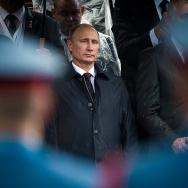In late February, Vladimir Putin sent Russian troops into Ukraine, sparking a humanitarian crisis that, according to many scholars and analysts, has upended a decades-old global order.
But while some have characterized the conflict as a return to the Cold War, one University of Chicago historian has argued that we must look further back. According to Prof. Faith Hillis, Putin doesn’t seek to resurrect the Soviet Union, but rather 19th-century imperialism—a threat made even more dangerous by modern surveillance technology.
“I think he wants to reconstitute the Russian Empire and its guiding ideologies, which were orthodoxy, autocracy and nationality—except now, under the power of a very sophisticated police state,” said Hillis, a professor of modern Russian history.
She examined the ongoing crisis in Ukraine during a March 4 discussion with UChicago political scientist Monika Nalepa. In an event hosted by the University’s Graham School, the two scholars analyzed the historical and political context for Putin’s decision to invade Ukraine.
Hillis emphasized that the current invasion is a result of Putin’s intolerance for Ukrainian sovereignty—not the inevitable outcome of historical or cultural trends. Yet history can help us understand why the Russian president is so “obsessed” with Ukraine, she said.
People in modern Ukraine and Russia both trace their countries’ origins to ninth-century Kyiv—a legacy Hillis explores further in her book Children of Rus’. Although Ukraine produced a number of notable communist leaders, and served as a major center of Soviet agriculture and industry, the region has also been resistant to Soviet rule. Ukraine’s recent efforts to strengthen its Western alliances, Nalepa added, have also threatened Putin’s view of the country as “a buffer between himself and the West.”
Putin has criticized the USSR in his speeches, Hillis noted, and his ideology seems to fall more in line with those of 19th-century Slavophiles—a group that championed Russia’s differences from the West while flattening differences among Slavic peoples. “It’s often put in a kind of condescending way, that Ukrainians’ differences are kind of cute or childlike, but Russia is the big brother,” Hillis said. “It preaches essentially that all the Slavs are a single nation.”
Nalepa, whose research focuses on post-communist Europe, also emphasized Putin’s rhetorical reliance on history. His false claims of “de-Nazifying” Ukraine, for example, arouse vivid memories of Soviet victories in World War II.
“I think he’s using memory politics in a very clever way to get support behind his actions at home,” said Nalepa, an associate professor of political science.
Such tactics have gained even more ground within an increasingly authoritarian Russian state. Putin has recently threatened imprisonment for protestors and those who spread “fake” news—essentially anything that contradicts the government’s official statements.
In moderating the event, Seth Green, dean of the Graham School, reflected on the “catastrophic impact” the conflict has already wrought, and asked the scholars to look ahead.
Although both Nalepa and Hillis have been encouraged by the recent outpouring of charity and humanitarian aid, the Russian military continues to advance. Countries around the world must also weigh the value of intervention against the risk of nuclear warfare.
Both scholars also stressed that Ukrainians are not the only ones who will suffer from Putin’s aggression. Even if Ukrainian forces fall, Putin would be inheriting a devastated country. Russia itself may soon become “a pariah state that’s cut off from the global economy,” said Hillis, who recently wrote in favor of punishing Russian oligarchs instead of relying purely on economic sanctions.
“The hope was that these sanctions would push Putin to a breaking point, create some kind of oligarchic uprising,” said Hillis. “But I think it’s also possible that he feels himself pushed against a wall, and gets more and more radical, and more and more violent.”
She and Nalepa also expressed hope that a brighter future may be in store for Russia, even if such a vision might be difficult to entertain at the moment.
“I don’t think countries are destined for democracy or for autocracy,” Nalepa said. “Whether democracy works as it should, it’s to a greater extent a function of its institutions than history and culture. It is actually possible to arrange a constitution, an electoral system, in a way that is as foolproof as possible.”
Added Hillis: “If there’s any country that's shown the capacity to turn on a dime, it’s Russia.”
